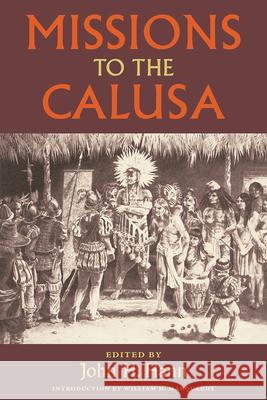Missions to the Calusa » książka
Missions to the Calusa
ISBN-13: 9780813010755 / Angielski / Twarda / 1991 / 560 str.
Missions to the Calusa
ISBN-13: 9780813010755 / Angielski / Twarda / 1991 / 560 str.
(netto: 166,90 VAT: 5%)
Najniższa cena z 30 dni: 174,88
ok. 22 dni roboczych.
Darmowa dostawa!
Finally, a comprehensive set of translations now exists for the enigmatic Calusa. Hann and Marquardt have assembled an exhaustive and diverse set of documents which locates the Calusa in their rightful place of importance in North American ethnography. Randolph Widmer, University of HoustonWhen Europeans arrived in southwest Florida in the early sixteenth century, they encountered a complex and powerful society. The Calusa, subject of this study by two of Florida s most eminent scholars, pose an enigma to anthropologists and historians. Their high political development marked by class distinctions, a special military force, and an elaborate belief system is typical of many agricultural societies. But the Calusa, a fisher-hunter-gatherer people, raised no crops.The work provides missing information on the ethnography of the Calusa, a society that inhabited the area of Florida now known as Charlotte, Lee, and Collier counties. The compilation of historical documents includes many reports never before translated into English, including letters from Pedro Menendez, reports from governors, bishops, soldiers, and King Charles II, and eyewitness testimony from priests and laypersons about mission efforts from the sixteenth through the eighteenth centuries.Hann introduces Spanish contact with the Calusa from the early seventeenth century, focusing particularly on the ill-fated Franciscan attempt in 1697 to convert the Calusa to Christianity. His documentation for this effort, more voluminous than for any other Spanish mission to Florida, is particularly valuable for its description of the role played by the Crown in instigating the mission despite little enthusiasm from religious authorities.Over two centuries the Calusa s relations with the Spaniards changed from wariness and hostility to a solid alliance with them against other Europeans. During the final fifty years of Calusa existence as a culture, other Native Americans, acting as agents of European opportunists, literally pushed the Calusa into the sea.John H. Hann, historical sites specialist for the Florida Bureau of Archaeological Research, Florida Department of State, is the author of Apalachee: The Land Between the Rivers, winner of the 1988 Rembert W. Patrick Memorial Book Prize for best book on Florida history. William H. Marquardt is associate curator in archaeology and director of the Southwest Florida Project at the Florida Museum of Natural History on the University of Florida campus. He also directs The Year of the Indian, an archaeology/education project that includes volunteer-assisted excavations at archaeological sites in southwest Florida."











